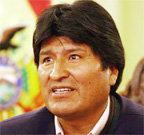LA PAZ, (Reuters) – Bolivia’s President Evo Morales leaves no doubt about who he blames for global warming.
“Capitalism is like a cancer for Mother Earth,” he declared in October to an audience of indigenous groups and farmers, environmental groups and UN Secretary-General Ban Ki-moon at a conference on climate change in the Bolivian town of Tiquipaya.
Indicting capitalism for causing climate change is a message that resonates with hardcore eco-activists who argue only a transformation of the global economy can end the world’s dependence on fossil fuels.
And it is why Morales, a once-poor, indigenous Aymara coca farmer who became Bolivia’s president nearly a decade ago, led a leftist Latin American bloc at Copenhagen in 2009 that helped scuttle the world’s last attempt to strike a climate treaty, arguing it did not go far enough.

As world leaders prepare to convene in Paris next week for another try, Morales is again coloring the run-up with stinging anti-capitalist rhetoric. But this time around, the government says, Bolivia is not looking to undermine a deal.
Diego Pacheco, Bolivia’s chief climate change negotiator, told Reuters this month that Morales will take pragmatic positions in Paris.
“We have ideas of which we would like to convince other countries and hope to advance our vision, but that doesn’t mean that we will block an agreement in Paris,” Pacheco said in an interview at his office in Bolivia’s capital, La Paz.
The more accommodating tone arises, critics say, from Bolivia’s need to exploit its own vast natural gas reserves, amid weakening support from allies for its hard-line stance.
Under Morales, Bolivia’s “indigenous socialism” of expanded social welfare, roads and schools has been financed by a decade-long gas boom that followed nationalization of oil and gas companies. Continuing that revenue flow – especially as he seeks to alter the country’s constitution so he can run for a fourth term – requires bringing new gas fields online, some of them in environmentally sensitive areas.
That includes places like the Parque Madidi, a massive national park where jaguars and bears roam virgin Amazonian rainforest and brightly colored parrots soar over the canopy.
Morales’ government has signed a decree allowing foreign energy giants to explore for hydrocarbons in the park, as well as to build a massive hydroelectric dam. The president says Bolivia must use its natural resources to pull people out of poverty and cannot afford to play “park ranger” over its forests for wealthy northern countries.
But the moves have dented his credibility with some environmental activists who say he has placed development ahead of protecting the environment.
“Indigenous groups had hope in Morales, for his indigenous profile, for his vision of wanting to develop a model that was different, more inclusive,” said Alex Villca, who represents an indigenous community that resides in Madidi. “But in recent years this hope has begun to disappear and we have begun to feel more threatened by the policies of the government.”
The tension between development and the environment was on display during a visit Morales made to France this month ahead of the climate summit. While citing the importance of a good climate deal, Morales urged French companies to partner with Bolivia’s nationalized firms to increase resource extraction.





